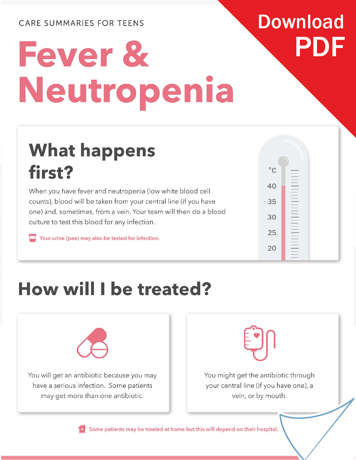Some chemotherapy drugs work by damaging cells as they are dividing and reproducing. In addition to damaging cancer cells, chemotherapy can also damage healthy cells in the body as they are dividing. Some healthy cells divide more often than others. Most chemotherapy side effects are related to where these frequently dividing cells are located in the body – most commonly your hair, skin, bone marrow and gastrointestinal (GI) tract, including your mouth, stomach and intestines.
Infections and blood counts
Your blood cells are always dividing. Your blood is made up of many different types of cells such as red blood cells, white blood cells and platelets.
Blood cells grow and divide in the bone marrow. Chemotherapy can kill these cells, leaving you with fewer cells in your blood, also known as a low blood count.

- A low red blood cell count (anemia) can make you feel tired.
- A low white blood cell count (neutropenia) can increase the risk for infections. Sometimes the only symptom of infection may be a fever. If you have a fever and low white blood cells, you may have to go to the hospital for antibiotics.
- A low platelet count (thrombocytopenia) in the blood can increase the risk of bruising or bleeding. Nosebleeds or bleeding gums when you brush your teeth may be more common.
You may be given transfusions of red cells and/or platelets if you need them.
You’ll soon become very familiar with your "counts". This is usually what your health-care team refers to when they’re testing your blood to see how many red blood cells, white blood cells and platelets are in your blood. You can speak with your health-care team about a "normal count" and how your individual counts compare. Often you have to wait until your counts recover (build back up) before you can go home or before you can start your next round of chemo.
Physical side effects
The side effects from treatment are different for each person. Unfortunately, it’s really hard to predict who will and who won’t get side effects, but it’s important to know what can happen.
Hair loss
Hair loss (alopecia) is the side effect of chemotherapy that most people think of, though it might not happen to everyone. It is also the side effect that many people fear the most. Loss or thinning of hair on your head is the most noticeable form of alopecia. You may also lose hair in other places such as eyelashes or eyebrows. There are ways to deal with hair loss. Remember that hair does grow back after chemotherapy stops.
Skin changes
- Dry skin: You may notice that your skin is more flaky and feels tighter or more itchy because it is drier than normal. Maintain good hygiene and use moisturizers on your skin. Remember to check with your health-care team before using creams, especially if you’re getting radiation treatment as well.
- Hyperpigmentation: Your skin may get darker in some areas or even all over. This usually goes away once you stop your chemotherapy, but it can be upsetting when it happens. Check out the page called Feeling good about yourself to learn how to deal with changes in your appearance.
- Photosensitivity: Your skin may become more sensitive to sunlight or UV rays when you are having treatment. You can get a sunburn more easily, so it’s really important to wear sunscreen and cover up as much as possible when you’re outside, even in the winter!
- Rashes: You may develop a rash of some kind while you’re on chemotherapy. These can be raised, itchy red areas on your skin, purple patches or spots, or areas of redness with patches of dry skin on top (psoriasis). Talk to your health-care team about any rashes you develop. They can give you creams or medicines to help prevent the rashes or help them heal.
- Acne: Chemotherapy drugs may cause acne to develop or make your existing acne worse. For many teens, this is a very upsetting side effect of the chemotherapy. Your health-care team can give you medications to help improve your acne if it gets worse.
Gastrointestinal effects
- Nausea and vomiting: This is the one of the most common side effects caused by chemotherapy. However, there are supportive care medications that can help!
- Constipation: This is a common side effect of many chemotherapy drugs and pain medications. As embarrassing as it might be, it’s very important you tell your health-care team if there are any problems having a bowel movement (pooing). Some chemotherapy can’t be started if you are not having bowel movements. Your health-care team can give you something to help you maintain regular bowel movements. Eating well and moving around also help keep you regular!
- Diarrhea: Another possible side effect of chemotherapy is loose, watery or frequent stools. If you develop diarrhea, tell your health-care team as soon as possible. Diarrhea can cause dehydration and it can be a sign of an infection that needs treating.
- Increased appetite and possible weight gain: Some drugs, such as corticosteroids, can actually increase your appetite. Speak to a dietitian for advice about making healthy food choices.
- Heartburn: Some drugs, such as corticosteroids, can cause acid reflux or heartburn. This can feel like a sour taste in your throat or a burning or sore throat. Supportive care medications can help with this symptom.
Fertility
Fertility is the ability to have children of your own. In males, cells called sperm are found in the testicles and are important for male fertility. In females, eggs found in ovaries are the cells that contribute to fertility.
Egg cells do not divide and may be only mildly affected by chemotherapy. However, girls having chemotherapy may stop having normal menstrual cycles (periods).
In boys, sperm cells divide quickly, meaning some types of chemotherapy can affect them. During chemotherapy, sperm production can go down, but may recover once chemotherapy is complete. However, if sperm do not recover, a boy may have difficulty having his own children. This can be very distressing.
Talk to your health-care team before starting treatment to see if your fertility may be affected and if there are options to try to preserve or save it.
Contraception
If you are sexually active during chemotherapy it is important to use contraception, especially a condom, to:
- avoid getting pregnant – chemotherapy drugs can harm a developing baby
- avoid passing any chemotherapy in your fluids to your partner
- prevent the spread of sexually transmitted infections (STIs)
It is normal for your health-care team to ask about your sexual history or activity.
See the lifestyle section for more information on sexuality during cancer.
Communicating side effects
Most cancer medications have side effects that may cause you to not want to take these medications anymore. Tell your doctor, nurse or pharmacist about the side effects because there are other medications that can help. Explain the side effect in as much detail as possible so that your health-care team can find a way to minimize it.
Supportive medications
Supportive medications are medications that help reduce the physical side effects from chemotherapy. Some of these medications work to fight the side effects directly, while other medications improve immune system function so that your body can fight infections better. Supportive medications also help keep your body as strong as possible during treatment. For example, you will usually be prescribed anti-nausea medications because nausea is a common side-effect of chemotherapy.
If you hear about something that you think might help with your treatment, always ask your health-care team before trying it. Your health-care team will have the best and most up-to-date information on the medication to help you.
Medications that help prevent or treat chemotherapy-induced nausea and vomiting
- Ondansetron
- Dexamethasone
- Lorazepam
- Nabilone
- Metoclopramide
- Granisetron
- Aprepitant
- Olanzapine
Medications that help prevent or treat constipation
- PEG flakes
- Lactulose
- Senna glycosides
- Bisacodyl
Medications that prevent PCP lung infection (a type of pneumonia)
- Cotrimoxazole
- Pentamidine
- Dapsone
Medications that prevent heartburn or reflux
- Antacids such as calcium carbonate
- Ranitidine
- Famotidine
- Omeprazole
- Esomeprazole
- Lansoprazole
Medications that support bone health
- Calcium
- Vitamin D
Do not take other types of vitamins, unless you have discussed them with your health-care team first.
Medications that boost white blood cell growth
- Filgrastim
- Pegfilgrastim
Medications that prevent or control pain
- Acetaminophen – check with your healthcare team first
- Morphine
- Hydromorphone
- Oxycodone
Important: Do not use ibuprofen or other non-steroidal anti-inflammatory drugs (NSAIDs) for pain relief.
Medications for mouth care
- Lidocaine (numbing) mouthwash for pain
- Baking soda mouth wash (also called sodium bicarbonate mouthwash)
Do not use store-bought mouthwashes that contain alcohol.

